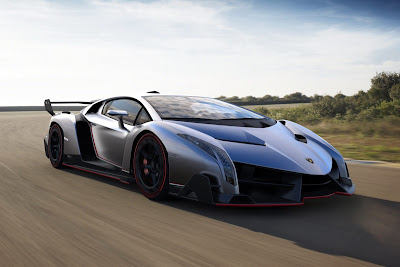While we can't really call the Aventador or the Gallardo 'conservatively styled', they definitely are compared to Lamborghini's Geneva showstopper – the Veneno, a car made to celebrate the Italian firm's 50th anniversary.
They call it a racing car for the road, and while that concept may have morphed into a cliché over the years, we can see where they're coming from, because the Veneno looks like a stylized LeMans prototype with turn signals.
Its elongated aerodynamic profile, long overhangs and massive rear wing show that this car was designed in a wind tunnel, in order to achieve a very low coefficient of drag, while also providing a lot of downforce. Just look at that comically large front splitter, the racecar-like open rear end purposeful-looking diffuser – they really wanted to make a statement in an age when all supercars are going green.
It is predictably powered by a large naturally-aspirated V12 engine, which displaces 6.5 liters. Based on the unit that powers the Aventador, the V12 has been tweaked to the tune of 50 extra horsepower, pushing the total output figure to 750 hp.
However, while that is a colossal power figure by regular car standards, it's not really that much, in an age when the most powerful supercars are nudging and even surpassing the 1,000hp barrier. Nevertheless, the car has a claimed top speed of 355 km/h (221 mph), and it can crack the 100 km/h (62 mph) barrier in 2.8 seconds, which is blisteringly fast no matter how much horsepower a car has (or doesn't have, in this case).
The impressive figures are due partly to the clever aerodynamics and partly to the car's lightweight construction. Made out of CFRP (carbon-fiber-reinforced-polymer), the car tips the scales at 1,450 kg (3,190 lbs), which is some 125 kg (275 lbs) lighter than the Aventador on which it is structurally based.
However, don't let the racy looks of the exterior fool you, the Veneno is well-appointed inside, featuring leather as well as Lamborghini-patented materials like 'Forged Composite' and 'Carbon Skin'.
Only three of these flamboyantly-styled supercars will be built, all of which have already been sold at a cost of €3 ($3.9 / £2.6) million a pop.





